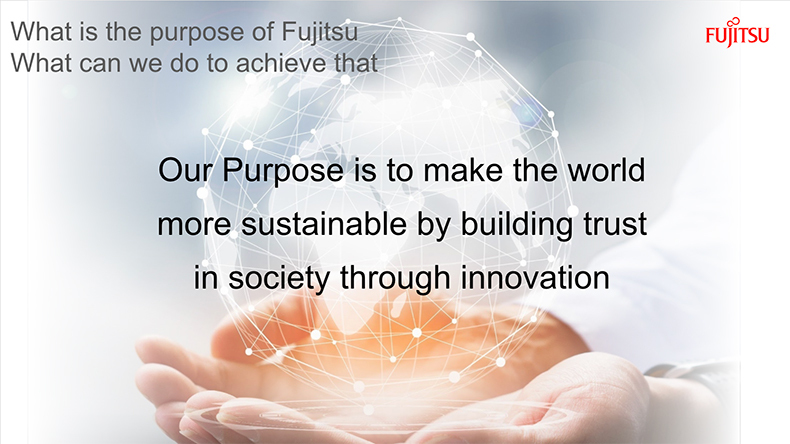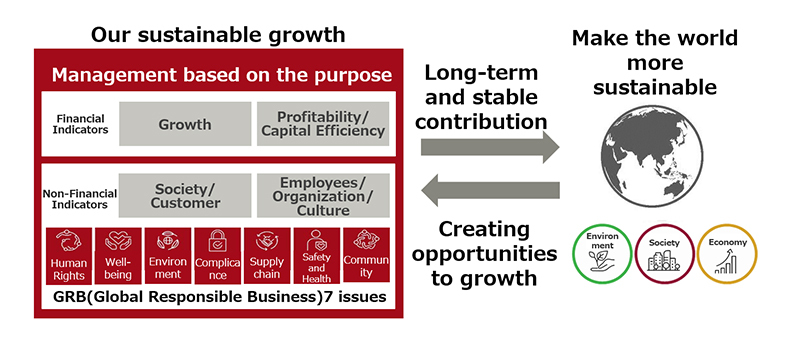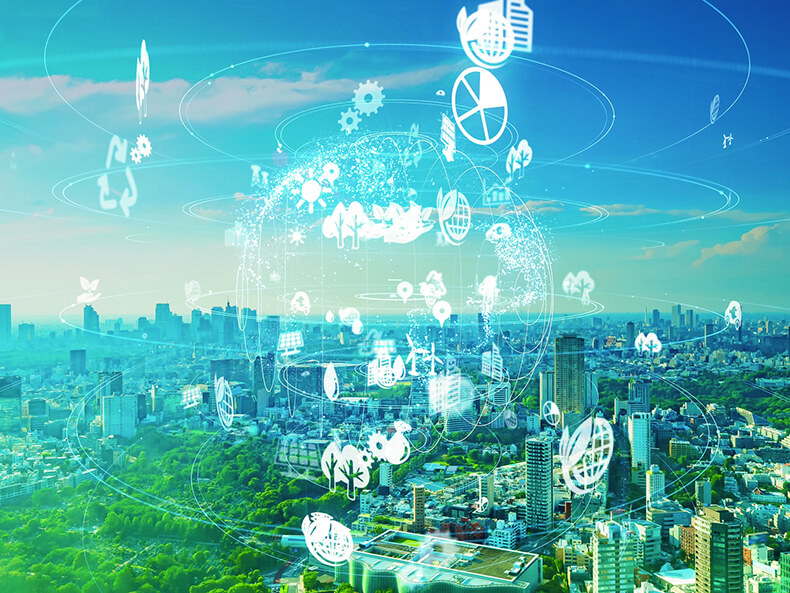Currently, initiatives aimed at realizing a sustainable society are accelerating on a global scale. In order to achieve the Sustainable Development Goals (SDGs), companies are being called upon to operate more sustainably than ever before.
Until quite recently, companies considered “social contribution” to be a way to cultivate relationships with society and something entirely separate from their core business operations. They would only give back to society when they turned a profit. This approach meant that when companies performed poorly, they wouldn't be able to contribute to society.
In contrast, companies are now expected to contribute to the establishment of a sustainable society more proactively as part of their social responsibility. In light of these circumstances, Fujitsu has also made a major shift toward corporate sustainability management. What has actually changed within the company? To find out, we spoke to Sogo Fujisaki, the Deputy Head of the Sustainability Unit.
 Sogo Fujisaki, Deputy Head, Sustainability Unit
Sogo Fujisaki, Deputy Head, Sustainability Unit
- Contents
-
- SX Is Essential for a Sustainable Society and Increases Corporate Value
- In the Long Run, SX Is the Only Path Forward. We Must Act Now As a Strategy for Corporate Survival
- A Strong Sense of Crisis: Why Was Fujitsu an Early Adopter of Corporate Sustainability Management?
- Recognizing Sustainability As an Individual Responsibility
- Giving Back the Earth to Future Generations: What Fujitsu Envisions As It Aims Toward the Realization of a Sustainable Society
SX Is Essential for a Sustainable Society and Increases Corporate Value

――The SDGs have become rather well known, but many people may still be unfamiliar with sustainability transformation (SX). Could you start off by telling us what SX is?
Fujisaki: As everyone knows, the SDGs are a collection of goals – national objectives – that each country should achieve by 2030 and that were adopted by the United Nations in 2015. On the other hand, sustainability transformation (SX) stems from the idea that we as companies must also transform ourselves to realize a sustainable world, as represented by those SDGs.
The first time I was introduced to the concept of SX was during a study group held by the Ministry of Economy, Trade and Industry, Japan in 2020. At this study group, it was said that companies need to have both business sustainability (the ability to sustain themselves) and social sustainability (environmental and social sustainability, as well as sustainability governance).
In the Long Run, SX Is the Only Path Forward. We Must Act Now As a Strategy for Corporate Survival
――Isn't it difficult for a company to help create a sustainable society while still turning a profit?
Fujisaki: What's key here is how we perceive sustainability in the first place. If we think of sustainability-related efforts as a short-term cost, it's easy to see it as an inconvenience. But ignoring sustainability is unacceptable on two fronts.
The first is social responsibility. It can be argued that many social and environmental issues, including climate change, were caused by corporate activity after the industrial revolution. Companies must bear responsibility for those actions and mitigate our impact through activities such as reducing CO2 emissions.
The second reason is corporate survival. Many stakeholders are watching to see whether companies can fulfill their social responsibilities. Those stakeholders may be investors, clients, or even younger generations that will support society in the future. If stakeholders give up on a company, it will not survive.
Therefore, what we need to do is to perceive sustainability as an investment for the future. We also need to transform our management over the long term so that both financial indicators (for generating profit) and non-financial indicators (for solving social issues) will work smoothly together. For that to happen, we need a transformation, including a transformation of our mindset. In fact, some studies have shown that companies with excellent non-financial initiatives have relatively high price book value ratios (PBR), and our company would like to investigate this correlation further as well.
In Europe, there are already cases where a company will only be taken seriously in business negotiations once they conduct socially responsible operations through their value chain. Companies are no longer being trusted in Europe unless they contribute appropriately to society.
Previously, it was believed that there would always be a tradeoff between sustainability and corporate profits, but now both are essential if companies are to survive sustainably. This has become a strategic focus. It may be possible to profit in the short term while contributing to environmental damage, but such a company will not survive in the long run.
A Strong Sense of Crisis: Why Was Fujitsu an Early Adopter of Corporate Sustainability Management?

――So far, you've said that SX is crucial for the future of both companies and society. Could you tell us about the circumstances that pushed Fujitsu to be one of the first companies to take a major step toward sustainability management?
Fujisaki: To be specific, our turning point was when we established our purpose in July of 2020 and, to align our purpose with our business activities, revised the “Fujitsu Way,” which describes our company's values and code of conduct. Our purpose is to make the world more sustainable by building trust in society through innovation. As is clear, Fujitsu’s purpose is firmly centered around sustainability.
If our company doesn't shift toward sustainability and help solve social issues that our customers face, neither our customers nor our planet will continue to exist. Naturally, that would also spell the end of our company. As we witnessed the initiatives of leading companies in Europe and America, we experienced a strong sense of crisis.
Fujitsu was founded 86 years ago and has always been committed to social contribution. Bringing great value to society is also a business opportunity for us since this also provides significant economic value to our company.
――Fujitsu has a reputation as a DX company. Is this connected to its SX initiatives?
Fujisaki: Ever since becoming CEO of Fujitsu, Takahito Tokita has stated that as a DX company, we will aim to solve social issues. DX is the adoption of a digital-centric business model, but the term doesn't define what direction companies take after that. In the case of Fujitsu, that future destination is our “purpose.” Our company believes that in the course of using digital technology to pursue our purpose (the realization of a sustainable society), we will naturally follow the path of sustainability transformation.
Recognizing Sustainability As an Individual Responsibility
――Even if the company has made a shift to sustainability management as part of its larger framework, I would expect that it's difficult for ordinary employees and departments to have a concrete grasp on what that entails and act accordingly. What is the company doing to address this?
Fujisaki: Since we report information such as non-financial management indicators in a top-down manner, it may be challenging to persuade individuals to view sustainability as their individual responsibility. That's why we coordinate with relevant departments to center sustainability in the business operations that our employees will directly face.
One example of this is that we are establishing systems to properly recognize actions that promote sustainability, such as through our employee commendation system. We have a Sustainability Contribution Award to commend employee activities such as helping to solve social issues using ICT or rapidly developing chatbots (which increased in demand due to COVID-19).
Last year, we had 127 applications from both Japan and abroad, and in June of this year, we awarded two grand prizes, six excellence awards, and thirteen special awards.
Currently, we also evaluate all business negotiations to assess whether they are connected to sustainability, and when giving external presentations, we highlight our contributions to the SDGs as well.
We have also revised our internal personnel evaluations. Evaluations for executive positions (higher than manager) now include assessments for social impact and behavior in addition to standard indicators such as sales and profit.
Beyond considering immediately visible indicators such as revenue, we have also set the seven issues outlined in the Global Responsible Business (GRB) framework as management objectives, and have otherwise created systems that enable the whole company to address these issues together. Through these initiatives, I believe our employees are becoming more actively involved in our sustainability efforts.
 Sustainability management at Fujitsu. The company has set both financial and non-financial management objectives to work toward the company's purpose.
Sustainability management at Fujitsu. The company has set both financial and non-financial management objectives to work toward the company's purpose.
Giving Back the Earth to Future Generations: What Fujitsu Envisions As It Aims Toward the Realization of a Sustainable Society

――Please tell us about the future world that Fujitsu envisions with its unique approach to SX.
Fujisaki: Fujitsu is in a particularly unique position where we can work toward realizing sustainability through our business operations within the company as well as with other companies.
For example, as part of our own response to climate change, we are working on conserving energy at our data centers and switching to renewable energy to power our offices.
At the same time, in addition to providing ICT as a tool for improving efficiency and optimization based on advanced predictions, we can also use our strengths as a DX company to contribute to society by working with many companies to solve customers' problems and social issues. For example, we are able to cooperate with companies in the food industry to apply digital technology to the issue of food loss and waste. In transportation and logistics, we can help save labor time as well as energy by using digital technology to improve the efficiency of the transportation of goods.
As for the future, I believe that we are heading into a new era in which we will use our strengths as a technology company and collaborate with our customers to consider how to respond to the demands and issues of society
Furthermore, realizing a sustainable society isn't a goal that one company or one country can achieve on its own. We must cooperate across industries and borders to achieve sustainability. In this respect, since global companies such as Fujitsu are not bound by national borders, I believe it is important for us to work together as one.
――Are global companies beginning to work together?
Fujisaki: Fujitsu is a member of the World Business Council for Sustainable Development (WBCSD), a CEO-led organization that includes over 200 global companies. Our CEO, Takahito Tokita, is a member of the executive committee. In February 2021, after discussing what the society of 2050 should look like and how technology should be used to achieve this vision, the WBCSD released the publication, “Vision 2050: Time to Transform.” The Japanese version will be available soon.
The SDGs have become a common language for the world. Using the SDGs as a starting point, I aspire to work together with my colleagues around the world to dream of realizing a better world through better business. We are currently merely borrowing the Earth and have a responsibility to pass it on to future generations. I would like to keep that in mind as we work to solve social issues.




